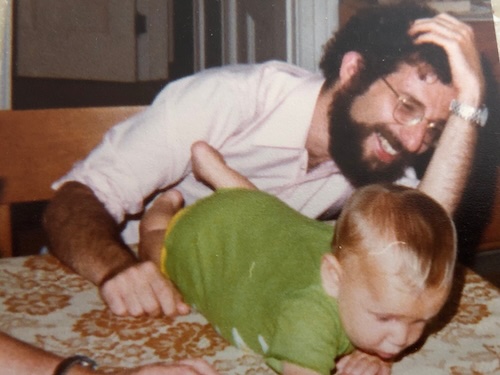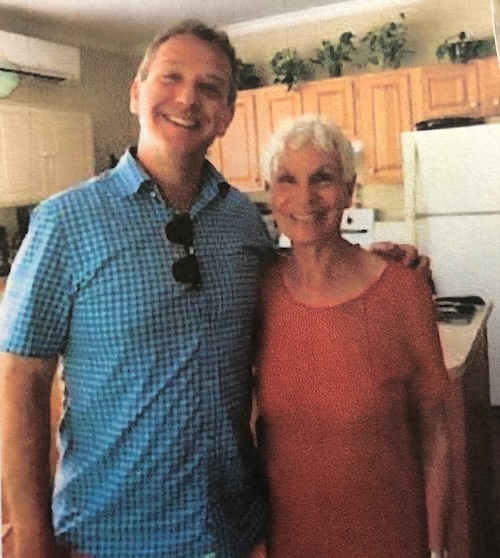|
Ronald
Brass |
|
|
Ronald
Brass |
|
![]()
|
......
Our 1965 Marsengold yearbook listed Ron's many academic and musical achievements and included a prescient quotation:
"Look like you know where you are going and the world will clear a path for you." Even then, as he mused about a career
in medicine, he was playing the clarinet and tenor saxophone and had a very clear idea of where he was going. From
Sharon High School, he went directly to Princeton University where he majored in history (of all things) and performed
in the Princeton Tiger Marching Band. For many years that was a strictly formal marching band, but during the late
1960's they began to experiment with humor and non-traditional instruments, evolving into a "scramble band" which, by
their own description, isn't much good at marching, and has to get in and out of formations by scrambling about and
is more likely to amble or saunter than march. We cannot be sure, but it seems likely that Ron had a hand in that
evolution. Not surprisingly, he did quite well at Princeton.
His next stop was the Medical School at the University of Southern California. During his third year at USC, he
attended a non-costume Halloween party where he met Shelley Eskin, a native of Queens, New York who had moved with
her family to Los Angeles at the age of 15. By the time they met, Shelley had graduated from UCLA and was teaching in
East Los Angeles, not too far from Ron's medical school. They talked through the whole party and then dated regularly
during the following year, at the end of which Ron broke up with her. She did not hear from him again for the next
three years.
After graduating from USC, Ron was chosen for one of best internship programs in the country: the intense rotation at
Johns Hopkins University in Baltimore. In typical sequencing, residency would follow internship, but Ron was never
typical. He had stayed in touch with friends at the USC Medical School and together three young doctors convinced the
US Public Health Service to send them where they might do some good. That turned out to be Tchula, Mississippi about
60 miles west of Jackson, the state capitol. It was a very isolated rural area, described by Sid Salter, a well known
Mississippi columnist at the time, as having "some of the best farmland in America" and "some of the most successful
plantations." Nonetheless, the three young doctors and one nurse ran a busy internal medicine clinic there for the
next two years, ignoring instructions from the town that they would need to to have separate entrances and segregated
waiting areas. During their tenure in Mississippi, the clinic brought in a dentist and added more technical support.
They were making a difference in people's lives. It was also a place where Ron could clear his head and begin thinking
about the future. He dabbled in photography and was serious enough to build a dark room to process his pictures. He
purchased a Triumph TR6 red sports car and then wrote to Shelley expressing regret that he had broken off their
relationship. Shelley was still teaching in Los Angeles, but began exchanging correspondence with him. After while,
he invited her to visit him and see the sprawling metropolis of Tchula and the clinic they were building. After some
prodding, Shelley eventually boarded a Greyhound bus in Los Angeles which would stop in Tchula on its way to New
Orleans. As the bus ride progressed, she became more and more hesitant about getting off, but when she told a fellow
passenger where she was going, the other lady, who lived in Tchula, could not say enough good things about the clinic
and especially about the well known Dr. Brass. From that point on, the deal was sealed. Shelley returned to Los Angeles
a week later, but the two had agreed that they wanted to be together.
In July of 1976, Ron drove his TR6 from Mississippi to Boston where he would commence his two year residency in
Internal Medicine at Boston City Hospital. Shelley arrived from California in her Toyota sedan and they rented an
apartment on Beacon Hill. They married in January 1977. Shelley began working on a Master's Degree in Speech Pathology
at Northeastern University and Ron was living the sleep deprived life of a resident in a tough city hospital. Still
they managed to find their footing together and in January 1979, their son Bernard was born. Shelley notes that during
their time on Beacon Hill, they took sailing lessons on the Charles River and eventually Ron bought a Sunfish sailboat
which they both enjoyed. One reality of city living is that parking is especially difficult. They had already determined
that trying to keep the TR6 there was just impractical, so they moved it back to Sharon and used it primarily on weekends. The Sunfish met a similar fate and was dispatched to Sharon where it was used on summer weekends on Lake Massapoag. One can only surmise that with the arrival of a baby, sailing and galavanting about in the sports car became lower priorities. The young family moved to Jamaica Plain.
At the conclusion of Ron's residency, he was offered at fellowship at Tufts University in Cardiology. Shelley believes
that he was influenced to accept the two year fellowship because his Dad had died of a heart attack while Ron was a
freshman at Princeton. By the time he finished at Tufts, Shelley had also wrapped up her Master's Degree in Speech
Pathology and the two set about looking for places in New England where they could live and practice. They traveled
widely in Maine and Vermont, but were recruited by a team of doctors in Portsmouth, New Hampshire. There were family
connections that made Portsmouth a logical place for them. They found a home and with little Bernie, who at that point
was only 1.5 years old, moved in. In September of 1980 Ron began his practice with specializations in Internal Medicine
and Cardiology. In December of 1980, he began to have symptoms which he thought might be a stress related ulcer, but
further testing at Deaconess Hospital in Boston revealed the worst news: it was metastatic colon cancer which had already
spread to the liver. The oncologists did what they could, but in the winter of 1981, the treatments available were
primitive by today's standards. Ron passed away in Portsmouth on April 13, 1981. He was only 33 years old. He was buried
at The Memorial Park in Sharon.
Shelley describes the aftermath of Ron's death in moving terms. The outpouring of love and support was overwhelming, even
in a community where they had barely settled in. She knew that she had found a true home and is still there today. For
the next seven years she worked as a Speech Pathologist, but became increasingly unhappy with that. Her outlook had
changed and she accepted the reality that even a life well lived can end without warning, so she decided to change
careers to something that would make her happy. She studied and became a licensed massage therapist. At first she worked
in a small private practice, but eventually joined an oncology practice where her skills made patients going through
cancer treatments more comfortable. She has a wide circle of supportive friends in Portsmouth and notes with pride that
she has learned as an adult to play Ron's old tenor sax. There is a note of sadness in her voice as she admits that she
never heard him play, but was sure that he had enjoyed his time playing at Princeton. Eventually she decided that it was
time to retire, but still enjoys all of the social and cultural advantages of Portsmouth, occasionally getting to Boston
as well.
Bernie grew up in Portsmouth. He graduated from Columbia University, where he would also major in history. His path
forward seemed more hesitant, no doubt still processing the loss of a father he barely knew. He took a variety of jobs
in the Berkeley, California area where he had decided to live; it took a while for him to conclude that he wanted to
go to medical school. His Dad's alma mater at USC was happy to accept him, but he decided that a year or so living in
Central and South America would sharpen his Spanish fluency and make him a more useful doctor. Eventually he did graduate
from the USC Medical School and did his internship at White Memorial Hospital in east Los Angeles where his Spanish
skills surely came in handy. After that he worked in a family practice group in the Napa/Sonoma area for a while and
then spent a year in Honolulu doing internal medicine. He has returned to the Boston area and now works for Harvard in
an Emergency Care Facility. He remains in close touch with Ron's extended family and is able to see his mother more
regularly.
It has been more than 43 years since Ron died, but Shelley still speaks of him with love and compassion. She still
admires him as one of the brightest people she has ever known and says with determination, "he was always so nice to
everyone." He had a well developed sense of humor but was very self-effacing. The world did in fact clear a path for
Dr. Ronald Brass, but he had barely started on it when we lost him. It is an object lesson in the fragility of life, but
we who knew him at the beginning could see the outline of the man he would become. We are better for having known him
and grateful beyond words to Shelley for sharing some of the details of his all too brief life with us. We salute his
accomplishments as a physician and a person, remembering him fondly as our friend.
 Ron with his infant son Bernard in 1979
 Ron's son Bernard with Bernard's Mom Shelley in 2023
|